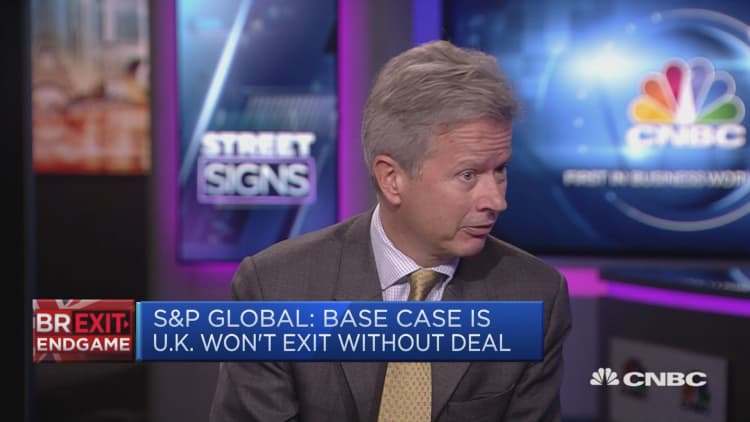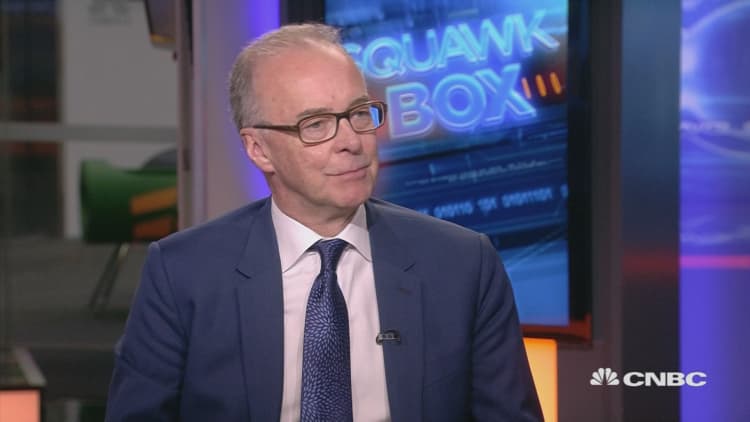France appears to have given the U.K. until the end of the week to discuss and come up with a workable Brexit plan, but analysts say it's very unlikely a deal could be reached in that short timeframe.
French President Emmanuel Macron reportedly told U.K. Prime Minister Boris Johnson on Sunday that Brexit negotiations should continue "swiftly" with the EU's chief negotiator Michel Barnier in order for Brussels to evaluate by the end of the week whether "a deal is possible that respects European Union principles." The comments were reportedly made by an official at the Elysee Palace who was repeating what Macron had told Johnson via telephone on Sunday, British media reported.
The comments, and call, come after the U.K. government submitted last-ditch proposals that it hoped could get around the contentious issue of the Irish "backstop" which has been seen as an obstacle to a Brexit deal being agreed by the U.K. Parliament.
The new proposals would see would see Northern Ireland (a part of the U.K.) stay in the European single market for goods but leave the customs union. The U.K. said checks on goods going from Northern Ireland to the Republic of Ireland would undergo customs checks away from the border taking away the need (the government said) for any physical border infrastructure on the island of Ireland.
But the plan received a lukewarm reception in Brussels. The EU is particularly concerned about how and whether customs arrangements (such as checks on goods), as envisaged in the British proposals, could and would work in practice.
Chance of a Brexit deal?
Time is fast running out for a Brexit deal to be agreed before the official departure date of October 31. After a tussle with Parliament, Johnson has been obliged by law (an act of Parliament known as the "Benn Act") to ask the EU for a delay to the departure date if no deal is agreed by October 19. Johnson has repeatedly said the U.K. will leave the bloc on Halloween come what may, however.
There is no guarantee the EU would agree to another delay either; France, in particular, is not keen. The EU is also reportedly keen to avoid last-minute discussions at an EU Summit on October 17 too. As such, Friday October 11 is seen as a formal cut-off point for talks.
Experts say the chances of a deal being sorted by the end of the week are next to nothing.

"With no sign of U.K. movement on customs, the chances of a deal this week are now close to zero; both sides, however, have an incentive to keep talks in play until their formal cut-off point on Friday," Mujtaba Rahman, managing director of Europe at Eurasia Group, said in a note Monday.
"It suits both the U.K. and EU to keep Boris Johnson's offer in play until this coming Friday — the EU's formal cut off point — even if these are 'talks about talks' rather than formal negotiations. Johnson can tell voters he tried hard for a deal, and the EU can avoid blame if there is no agreement, or (unlikely) a no-deal exit."
As Johnson has been so adamant that the U.K. would leave the EU on October 31 under any scenario, Eurasia Group believes that the U.K. leader would feign being forced to demand an extension in order to appease Leave voters ahead of a possible election.
"We think Johnson will pursue a strategy some aides describe as 'being dragged, kicking and screaming' into an extension, so Leave voters know he is doing it against his will. This is why he still promises 'no delay' even though he knows the prospects of a deal are remote," he noted.
Even though a further extension to Brexit would be anathema to some EU officials and leaders, Brussels will not want to be seen as the party that scuppered a deal, experts say. "The only difficult questions for EU leaders will be its duration (December or January) and conditions," Rahman added.
Economic hit
Investors remain on tenterhooks over which direction Brexit will take after months of twists and turns for the departure process. On Monday, sterling traded slightly lower against the dollar, at $1.2320, while London's FTSE 100 index was almost 0.3% higher.
Not all analysts see a no-deal Brexit — the dreaded "cliff-edge" scenario in which the U.K. leaves the EU overnight — as being off the table, however.
Paul Watters, senior director and head of corporate research at S&P Global Ratings, told CNBC Monday that his company's base case scenario is that the U.K. won't leave the EU without a deal. But, it still sees the risk of a no-deal Brexit as being "meaningful."

"(The risk) should not be ignored but, at the same time recognizing what's going on and given the Benn Act takes effect at the end of the month we think that a no-deal is quite unlikely. The landing zone to a 'no-deal' (scenario) really follows, potentially, a general election depending on what the outcome is of that," he told CNBC's "Street Signs."
S&P forecast on Friday that U.K. GDP would shrink by 2.8% in 2020 in a no-deal scenario and that in 2021, output would be 4.7% lower than under its base case scenario, in which the U.K. and EU agreed on a deal.
"We estimate the U.K. economy lost about 3% of GDP in the 10 quarters that followed the EU referendum, compared to a remain outcome," S&P said in a Brexit report. "Our scenario analysis suggests a no-deal Brexit would do more long-term economic harm than if a deal was reached," it added.


